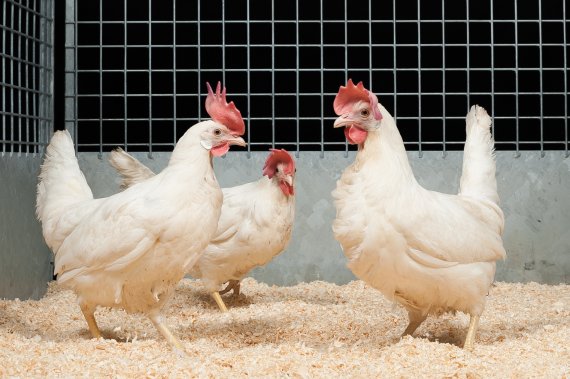©Tom Berghof
Immune system
Natural antibodies are part of a chicken’s immune system. These proteins recognize pathogens that the bird has never come across. Berghof thinks they recognize and inhibit all bacterial diseases. He has demonstrated their effect for one type of bacterium.
Berghof was given a female breeding line by the breeding company Hendrix Genetics. He measured the number of natural antibodies in the blood of the chickens when they were 16 weeks old. He used that data to select two lines, one with a lot of natural antibodies and one with very few. After four and six generations, he exposed these ‘high’ and ‘low’ lines to a pathogenic E. coli bacterium. In the high line, which had over four times as many natural antibodies, far fewer birds became infected and significantly fewer died.
Production
He made another important finding. Earlier research on robust chickens had suggested a trade-off between production and health: hens that invested more in resistance produce less. But Berghof’s experiments did not show this at all. ‘The chicks with more antibodies probably invest more in resistance when young, before they start laying eggs, but benefit from this once they begin laying.’
Natural
Berghof advises Hendrix Genetics to start selecting for natural antibodies when breeding chickens. ‘Then you use the chickens’ natural potential. The genetic route also delivers a lasting improvement as the greater resistance is embedded permanently.’
The benefits to society are considerable, says Berghof. ‘Disease will not spread so quickly in a barn of laying hens with a lot of natural antibodies. That will reduce the number of losses, improve welfare and drive down the use of antibiotics. But there will always be animal diseases that are too powerful for the antibodies. You will need vaccination or farm management measures to tackle them.’
Berghof denkt dat de maatschappelijke voordelen aanzienlijk zijn. ‘In een kippenstal met leghennen met veel natuurlijke antilichamen zal een ziekte minder snel spreiden, waardoor de dieren minder snel ziek worden. Dat leidt tot minder uitval, hoger welzijn en minder antibioticagebruik. Maar er zullen altijd dierziekten blijven die te krachtig zijn voor de antilichamen. Die moet je bestrijden met vaccinaties of managementmaatregelen.’

